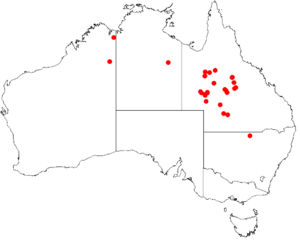Sida spenceriana facts for kids
Quick facts for kids Sida spenceriana |
|
|---|---|
| Conservation status | |
|
DD (TPWCA)
|
|
| Scientific classification |
|
| Kingdom: | Plantae |
| Clade: | Tracheophytes |
| Clade: | Angiosperms |
| Clade: | Eudicots |
| Clade: | Rosids |
| Order: | Malvales |
| Family: | Malvaceae |
| Genus: | Sida |
| Species: |
S. spenceriana
|
| Binomial name | |
| Sida spenceriana |
|
 |
|
| Occurrence data from AVH | |
| Script error: The function "autoWithCaption" does not exist. | |
Script error: No such module "Check for conflicting parameters".
Sida spenceriana is a small plant that belongs to the Malvaceae family, also known as the mallow family. You can find this plant growing in parts of Queensland, the Northern Territory, and Western Australia in Australia.
Contents
What Does Sida Spenceriana Look Like?
Sida spenceriana can grow as a small herb or a shrub. Its stems are covered in tiny hairs. The leaves are simple, meaning they don't have lobes, and their edges are smooth. They are usually about 10 to 24 millimeters long and 1.5 to 3 millimeters wide. These leaves also have special star-shaped hairs on them.
Near the leaves, you'll find small leaf-like parts called stipules, which are about 7 to 10 millimeters long. These stipules stay on the plant even as the leaves get older.
Flowers and Fruits
The flowers of Sida spenceriana grow on a stalk called a pedicel, which is 15 to 30 millimeters long. The flower has two main parts: the calyx and the corolla. Both of these parts also have those star-shaped hairs.
The calyx is green and about 4 millimeters long. Its parts are joined together for at least half their length. The corolla, which is the showy part of the flower, is yellow and about 6 millimeters long. It does not have hairs. Inside the flower, there are many stamens (the male parts) that are joined together in a tube around the style (the female part). The anthers, which hold pollen, are tiny, only about 0.5 millimeters long. The ovary, where seeds develop, is smooth. There is one style, about 2.7 millimeters long, which usually has five or more smooth branches.
This plant produces fruits called schizocarps. These are dry fruits that split into several one-seeded parts when they are ripe. In Western Australia, Sida spenceriana typically flowers in August.
Where Does Sida Spenceriana Grow?
Sida spenceriana is found in several regions across Australia. In Western Australia, it grows in areas known as Tanami and Victoria Bonaparte. In the Northern Territory, you can find it in the Gulf Plains and Mitchell Grass Downs regions.
How Was Sida Spenceriana Named?
The plant Sida spenceriana was first officially described in 1885 by a famous botanist named Ferdinand von Mueller. He named it after Jessie Spencer, who collected the first specimen of the plant. She found it near Yappunyah and Thargomindah, close to the Paroo River, also in 1885.
Is Sida Spenceriana Endangered?
The conservation status of Sida spenceriana varies depending on where it grows:
- In Western Australia, it is considered "not threatened," meaning it is not at risk of disappearing.
- In the Northern Territory, it is listed as "data deficient." This means there isn't enough information yet to know if it's at risk or not.
- In Queensland, it is listed as of "least concern," which means it is widespread and abundant.
- Bean, A.R. Key to the Species of Sida in Queensland
Images for kids
 | Kyle Baker |
 | Joseph Yoakum |
 | Laura Wheeler Waring |
 | Henry Ossawa Tanner |


